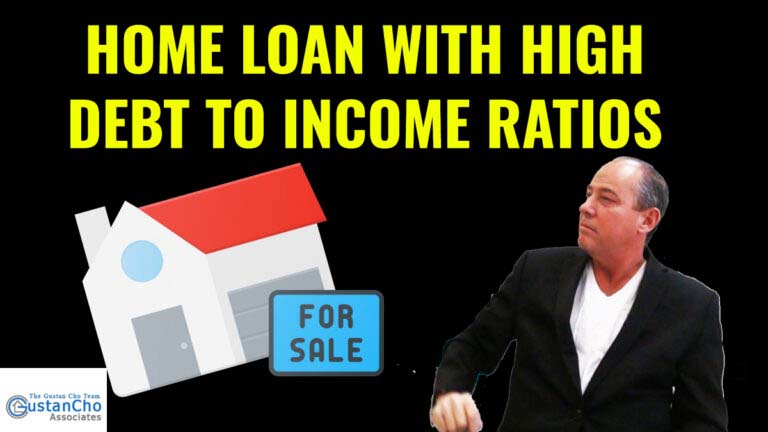Solutions To High DTI Mortgage Lending Guidelines
This guide covers solutions to high DTI mortgage lending guidelines. We will discuss finding creative solutions to high DTI. Home borrowers with high debt-to-income ratios can find creative solutions to high DTI. The debt-to-income ratio is one of the major reasons why mortgage borrowers cannot qualify for a home loan.
The debt-to-income ratio is calculated by adding the borrower’s minimum monthly payments, including the proposed P.I.T.I ( principal, interest, taxes, and insurance ) and dividing it by the borrower’s monthly gross income.
FHA loans have the most generous debt-to-income ratio caps out of all mortgage loan programs. FHA mortgage loan borrowers with a 620 credit score or higher can have a back income ratio as high as 56.9% DTI. However, if your credit score is under 620, HUD reduces the debt-to-income ratios to 43% DTI Cap to get an approve/eligible per automated underwriting system. In this article, we will cover and discuss qualifying for a mortgage with high debt-to-income ratios.
Debt-To-Income Ratio Mortgage Guidelines
Every loan program has its debt-to-income ratio requirements. Fannie Mae mandates a maximum debt-to-income ratio of 50% DTI to qualify for conventional loans. USDA loans cap the debt-to-income ratios to 29% front-end and 41% back-end DTI. If the borrower needs to pay down their credit cards during the mortgage approval process, they do not only need to pay down the credit card balances.
VA loans debt to income ratios are per automated findings per Automated Underwriting System. VA does not have a minimum credit score requirement nor debt to income ratio cap
Most jumbo mortgage lenders cap the debt-to-income ratio to 40% DTI for Jumbo Mortgages. Most portfolio mortgage lenders cap their debt-to-income ratios at 43% DTI on loan programs. Gustan Cho Associates has Jumbo Loan Programs with over 50% DTI caps.
Solutions To High DTI By Paying Down Credit Cards
Paying down credit card balances is one of the most common solutions to high DTI. Suppose the borrower has a very high debt-to-income ratio and has credit card balances. In that case, it is highly recommended that they pay down all of their credit cards before having the mortgage loan officer register and submit the loan to processing and underwriting.
But they also need to close out their credit card accounts. FHA and Fannie Mae Mortgage Lending Guidelines state that if borrower needs to pay down their credit card balances during the mortgage approval process, the credit card also needs to be closed
Borrowers need to pay credit cards and close credit card accounts. It needs to be reflected on the consumer’s credit report. However, suppose borrowers have their credit card balances paid off before the loan officer submits their mortgage loan application to processing and underwriting. In that case, they do not have to close their credit card accounts.
Solutions To High DTI By Shopping For Homeowners Insurance
For borrowers with high debt-to-income ratios, every dollar in monthly expenses can be a potential deal-breaker. One solution to high DTI is shopping for homeowners’ insurance, where you can get the lowest possible premium for the best coverage. The homeowner’s insurance agent should be creative and see if he or she can give you a discounted rate if you do a package deal by including cars and other insurance needs with new homeowners insurance.
Homeowners insurance can vary from insurance company to insurance company. Shopping for homeowners insurance should be done early in the mortgage process and not at the last minute.
The mortgage loan originator, real estate attorney, and real estate broker should all have contacts with homeowners insurance agents. Please get more than one homeowner’s insurance quote. Compare apples to apples to make sure that you get the best deal. The paid-down or paid-off credit card balances must be reflected on the credit report. This can be done through a rapid rescore. Freddie Mac does allow borrowers to pay down or pay off their credit card balances during the mortgage process without having them close it out.
Other Solutions To High DTI
Buying down the rate with points is another solution to high DTI. Buying down mortgage rates can be expensive. On average, it would cost a borrower 1 Discount Point, or 1% of the loan amount, to buy down a 0.25% mortgage interest rate. So, by buying down 0.50% of mortgage interest rates, a borrower must pay 2 points or 2% of the loan balance. On a $200,000 mortgage loan, one point equals 1% of the $200,000 balance, which is $2,000. 2 Points on a $200,000 loan amount is equivalent to $4,000
Using Seller Concessions For Closing Costs and Buying Dow Rates
Homebuyers can use seller concessions for points to buy down mortgage interest rates. FHA loans allow up to 6% in seller concession credits for home sellers to offer homebuyers towards closing costs. Buying points are considered part of closing costs. VA loans allow up to 4% in seller concessions, and conventional loans allow up to 3% of seller concessions for primary and second home financing and 2% of seller concessions for investment home financing.




